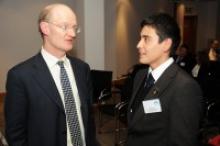
Capital L – the London Consortium of Routes into Languages held a major event to celebrate and disseminate its achievements at the UBS conference centre in Central London. David Willets, Minister for Universities and Science spoke about the value of language learning and signalled the Government’s commitment to a distinctive level of support for modern languages.
David Willets told the audience that he believes that it is important that people in Britain feel comfortable with foreign languages “not just for economic reasons, but also for understanding other people, other cultures and ourselves”. Mr Willets’ assurance that the Department for Business and Innovation and the Department for Education are committed to strengthening the teaching and learning of modern foreign languages was widely welcomed by the students, teachers, lecturers, senior university colleagues and linguists who attended the event.
Acknowledging concerns about how changes to Higher Education funding will affect Arts and the Humanities, Mr Willets stated “our administration recognises that modern languages are strategically important and vulnerable.” He then went on to say “we are committed to a distinctive level of support for modern languages.”
Torcato Coutinho, Curriculum Manager at the College of Haringey, Enfield and North East London explained that he first became involved with Capital L to offer his students the opportunity to explore for themselves possible employment routes afforded by language skills. His students Janeta Voicu, Jennifer Ampeh and Tenica Achord-Green are studying languages alongside accountancy and have plans to work for global organisations such as UBS, who hosted the event.
Richard Hardie, Chair of UBS, said that “a candidate who presents themselves as a graduate with good oral and written linguistic skills stands out in the crowd. They’re becoming increasingly rare and their places are being taken by people from other education systems where a strong competency in another language, usually English, is taken for granted”. Mr Hardie would warmly welcome seeing more young people learning languages in State schools; “London is a great cosmopolitan melting-pot and by not giving our young people a grounding in languages we deny them access to so many avenues of employment in London as well as overseas”.

